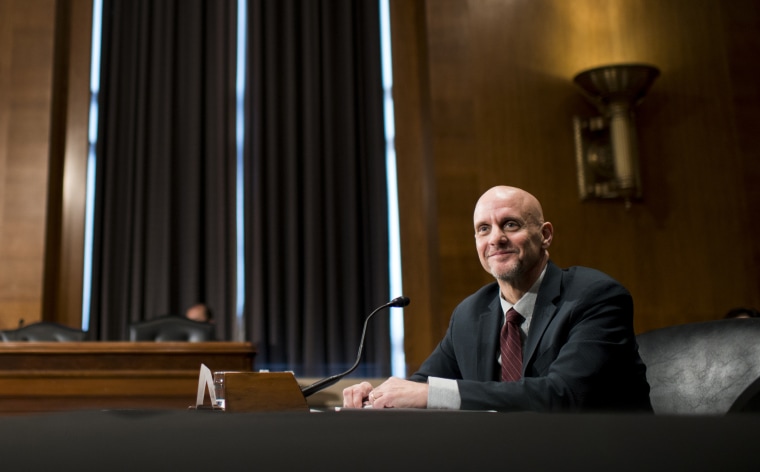In what amounts to a profound disregard for the literal health of our nation, senators from both parties confirmed Dr. Stephen M. Hahn as commissioner of the Food and Drug Administration on Thursday despite his steadfast refusal to answer even basic questions on the vaping crisis that has struck nearly 2,300 Americans and caused almost 50 deaths.
The severe but to date definitively unexplained lung injuries caused by vaping have consumed headlines in the latter half of 2019 and arguably pose the biggest public health crisis of the Trump administration. The one slim silver lining is that it has brought well-deserved scrutiny to how the FDA has dropped the ball on this problem for years. The FDA, after all, has an unambiguous responsibility to evaluate all tobacco products (including e-cigarette devices) for health and safety impacts, a scrutiny that no such device on the market has received to date, though in several instances, they’ve been on the market for over a decade. That is an astonishing breach.
The FDA has dropped the ball on this problem for years. The FDA, after all, has an unambiguous responsibility to evaluate all tobacco products.
And yet the next head of the agency charged with protecting Americans from preventable risks like those from vaping did not feel compelled to comment. Rather, Hahn deferred to the White House’s position on the issue, which so far has been to express concern but do nothing. For instance, after intense pressure from the vaping industry, the administration reversed itself on a proposed ban on flavored e-cigarettes, a policy endorsed by a wide array of organizations, such as the Campaign for Tobacco Free Kids and the American Medical Association.
The FDA’s Office of Tobacco Products, which regulates the manufacturing, distribution and marketing of cigarettes, should do the same with e-cigarettes immediately. Americans deserve a clear and detailed answer — if it exists — on how Hahn expects to regulate the vaping industry. If he doesn’t have a plan, he shouldn’t be the FDA chief, especially since the National Youth Tobacco Survey released this month by the Centers for Disease Control and Prevention revealed that over 1 in 4 high schoolers now use an e-cigarette device, from approximately 1 in 5 just last year.
E-cigarettes are overwhelmingly the nicotine product of choice among our youth, far outpacing cigars and conventional cigarettes by usage rates that are 4 or 5 times higher. Nicotine affects adolescent brain development and is a well-established gateway to other illicit substances (like cocaine). We need far less, not more, vaping in America. Yet creative marketing strategies from e-cigarette companies have made these devices, which vaporize nicotine through heating a liquid in an electronic device, appeal to young people.
Just as we rigorously regulate tobacco cigarettes and alcohol products with minimum age-of-purchase laws, acceptable legal limits of intake while operating vehicles (in the case of alcohol), and other standards on manufacturing, we should do the same with e-cigarettes. What’s the argument against this line of thinking, other than that taking this stand may upset the vaping lobby? Hahn should not be allowed to avoid this question and still get promoted.
But a quick review of the conduct of other high-level health appointees under Trump shows why Hahn would believe he could get away with silence: Commitment to the ideals of American public health is not a requirement for nomination.
Is it any surprise that Trump’s first FDA commissioner, Dr. Scott Gottlieb, actually sat on the board of a company (Kure) that ran vaping lounges nationwide before his nomination? Once in office, Gottlieb extended for four years the deadline by which vaping companies had to submit their e-cigarette devices for safety review. This was ultimately overturned in May via a lawsuit filed by the American Academy of Pediatrics and other health groups.
Now, as an ex-FDA commissioner, Gottlieb is faced with the sobering reality that his decisions only facilitated the rise of the vaping crisis. These facts make his current statements strongly supporting strict regulation of the industry appallingly inauthentic. When he had a chance to lead, he sided with corporate interests. Now, he wants to be courageous in order to protect his legacy. Please, spare us the faux empathy and public efforts to acquit yourself of responsibility, Scott.
Or how about our surgeon general, Dr. Jerome Adams, and his reticence in the wake of the vaping ban reversal? He’s supposed to be the definitive voice for improving public health nationwide, so how about we hear his thoughts? (His last formal advisory on the issue was filled with platitudes and dated Dec. 18, 2018.) Adams should have found Trump’s flavor ban reversal so intolerable that it warranted resignation. After all, commitment to the Hippocratic Oath should supersede the desire to maintain a prestigious title.
The complete loss of professional integrity among many of our nation’s appointed health officials demeans the grandeur and seriousness of the offices they occupy. FDA commissioners once carried out a sacred duty to protect the American people from the adverse effects of many of the things they relied upon in their daily lives, such as medical drugs and devices. Similarly, it was the office of the surgeon general that published a landmark report in 1964 on the health effects of smoking, ushering in a new age in which data and evidence play an indelible role in public health policy.
It is difficult if not impossible to imagine Hahn taking such a bold and courageous step. Leadership – especially in health – demands a commitment to placing the welfare of others before one’s own personal gain, a standard that Hahn has clearly failed to meet.


